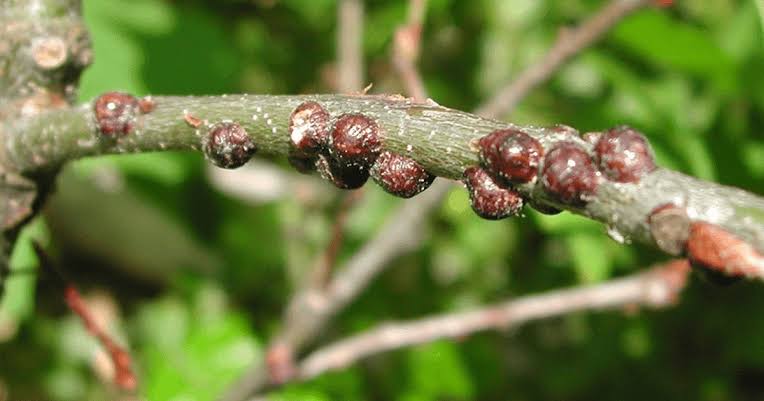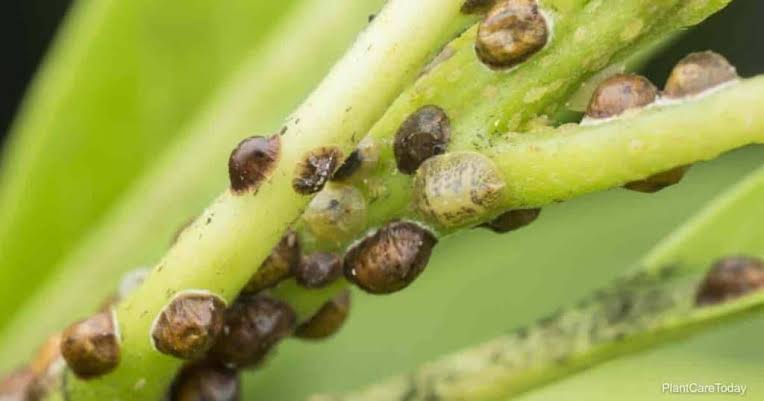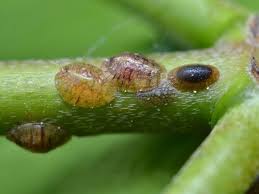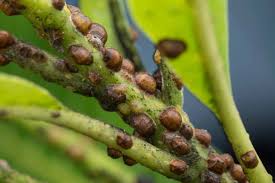Scale insects, scientifically known as Coccoidea, are small creatures that can be found on plants. They are not like regular insects as they have a unique protective covering that looks like scales. These insects come in various shapes, sizes, and colors, making them intriguing to observe.
One of the distinctive features of scale insects is their ability to attach themselves to plants and feed on the sap. They do this by using their specialized mouthparts, called stylets, to pierce the plant’s tissue and extract the nutrient-rich sap. This feeding process can weaken the plant and, in severe cases, lead to its decline.
Scale insects reproduce in different ways, depending on the species. Some lay eggs, while others give birth to live young ones. The protective covering of scale insects serves as a shield, safeguarding them from various environmental factors and predators. This covering is often wax-like or made of a substance known as “felt.”
Farmers and gardeners pay close attention to scale insects because they can harm plants and crops. These tiny creatures can spread quickly and, if not controlled, cause damage to a wide range of vegetation. To manage scale insect infestations, people often use insecticidal soaps or oils, which help to reduce their numbers and protect the plants.
Interestingly, ants and certain types of wasps have formed symbiotic relationships with scale insects. Ants, attracted to the sugary honeydew excreted by the scales, protect them from predators in exchange for this sweet substance. This interaction showcases the complex relationships that exist in the natural world.
In addition, scale insects, or Coccoidea, are remarkable creatures with unique characteristics. Their ability to attach to plants, feed on sap, and reproduce in diverse ways makes them a subject of interest for scientists, farmers, and gardeners alike. Understanding these insects and finding effective ways to manage their populations is crucial for maintaining the health of plants and crops in various ecosystems.
Read Also: Pawpaws: History, Nutrition, Health Benefits and Growing Guide
Plants Affected by Scale insects (Coccoidea)

Scale insects can affect a wide variety of plants, ranging from ornamental plants to fruit trees. Some common plants that are often targeted by scale insects include:
1. Fruit Trees:
Citrus Trees: Scale insects can infest citrus trees, such as oranges, lemons, and limes, leading to reduced fruit quality and yield.
Apple Trees: Apple orchards may face challenges when scale insects infest, affecting the health of the trees and the quality of the apples.
2. Ornamental Plants:
Camellias: These beautiful flowering plants are susceptible to scale insect infestations, which can affect their overall appearance.
Azaleas: Azalea bushes may suffer from scale insects, causing damage to the leaves and compromising the plant’s health.
Holly Shrubs: Scale insects can impact holly plants, affecting their vibrant green leaves and potentially causing them to drop prematurely.
3. Indoor Plants:
Ficus Trees: Scale insects can find their way to indoor plants like ficus trees, causing harm to the leaves and overall vitality.
Spider Plants: Even common indoor plants like spider plants can be affected by scale insects, impacting their growth.
4. Vegetables:
Tomatoes: Scale insects may pose a threat to tomato plants, affecting the quality and yield of the tomatoes.
5. Landscaping Plants:
Boxwood Shrubs: Landscaping plants, such as boxwood shrubs, can suffer from scale insect infestations, leading to visible damage.
6. Palm Trees:
Date Palms: Scale insects can infest date palms, causing damage to the fronds and affecting the overall health of the tree.
It’s important for gardeners, farmers, and plant enthusiasts to monitor their plants regularly for signs of scale insect infestations. Early detection and appropriate management strategies, such as the use of insecticidal soaps or oils, can help mitigate the impact of scale insects on these various plant species.
Damages Caused by Scale Insects

Scale insects can cause several damages to plants, affecting their overall health and appearance. The impacts of scale insect infestations include:
1. Reduced Growth: Scale insects feed on the sap of plants, which can lead to a decrease in the overall growth and vigor of the affected plant. This is particularly noticeable in young plants or new growth.
2. Weakened Plants: Continuous feeding by scale insects weakens plants by depriving them of essential nutrients. Weakened plants are more susceptible to other stressors, such as environmental conditions and diseases.
3. Yellowing of Leaves: As scale insects withdraw sap from plants, the leaves may start to yellow. This discoloration is a visible sign of stress and nutrient deficiency.
4. Premature Leaf Drop: Severe infestations can lead to the premature dropping of leaves. This can be detrimental, especially for deciduous trees or plants that rely on their leaves for photosynthesis.
5. Honeydew and Sooty Mold: Scale insects excrete a sugary substance called honeydew. This honeydew attracts ants and can lead to the growth of sooty mold, which forms a black coating on the leaves, hindering photosynthesis.
6. Deformed Fruits: Fruit-bearing plants may produce deformed or stunted fruits when infested by scale insects. The damage to developing fruits can result in economic losses for farmers.
7. Distorted Plant Shape: The presence of scale insects and their protective coverings can distort the natural shape of plants. This can be especially detrimental for ornamental plants grown for their aesthetic appeal.
8. Spread of Plant Diseases: Scale insects can act as vectors for plant diseases, transmitting pathogens from one plant to another. This can lead to the introduction or spread of diseases within a plant population.
9. Impact on Agricultural Crops: In agricultural settings, scale insects can significantly impact crop yields and quality, affecting the livelihoods of farmers and the availability of food resources.
10. Loss of Aesthetic Value: For ornamental plants and landscapes, scale insect damage can diminish the visual appeal of gardens and outdoor spaces, reducing the aesthetic value of the affected plants.
Efficient management strategies, such as the use of insecticidal treatments, biological control methods, and regular monitoring, are essential to minimize the damages caused by scale insects and protect the health of plants.
Read Also: Breadfruit: History, Nutrition, Health Benefits and Growing Guide
Control and Preventive Measures

Controlling and preventing scale insect infestations requires a combination of proactive measures and targeted treatments. Here are some effective strategies:
1. Pruning and Removing Infested Branches: Regularly inspect plants and prune away infested branches. This helps to reduce the scale insect population and minimize the spread of the infestation.
2. Natural Predators: Encourage natural predators of scale insects, such as ladybugs, lacewings, and parasitic wasps. These beneficial insects help keep scale populations in check.
3. Horticultural Oils: Apply horticultural oils to suffocate and eliminate scale insects. These oils disrupt the protective covering of the scales, making them more vulnerable to natural predators and environmental factors.
4. Insecticidal Soaps: Use insecticidal soaps to control scale insects. These soaps disrupt the cell membranes of the scales, effectively killing them. Regular applications may be necessary for optimal results.
5. Systemic Insecticides: Consider systemic insecticides for persistent infestations. These are absorbed by the plant and distributed through its vascular system, providing long-term protection against scale insects.
6. Beneficial Nematodes: Introduce beneficial nematodes to the soil around affected plants. These microscopic organisms can attack and parasitize scale insects in their early life stages.
7. Regular Monitoring: Monitor plants regularly for signs of scale infestations. Early detection allows for prompt action, reducing the likelihood of severe damage.
8. Pruning and Thinning Dense Foliage: Scale insects thrive in sheltered environments. Prune and thin dense foliage to improve air circulation and create an inhospitable environment for these pests.
9. Ant Control: Control ant populations near plants affected by scale insects. Ants are known to protect scale insects in exchange for honeydew, so disrupting this relationship can help in controlling scale infestations.
10. Quarantine New Plants: Quarantine newly acquired plants before introducing them to your garden or landscape. This precautionary measure helps prevent the introduction of scale insects or other pests to your existing plants.
11. Cultural Practices: Maintain healthy plants through proper watering, fertilization, and overall plant care. Healthy plants are better equipped to resist and recover from scale insect attacks.
Implementing a combination of these control and preventive measures is essential for effectively managing scale insect infestations and protecting the health of your plants. Regular vigilance and a proactive approach contribute to the long-term well-being of your garden or agricultural crops.
Frequently Asked Questions (FAQs) About Scale Insects (Coccoidea)
1. Q: What are scale insects?
A: Scale insects are small pests that attach themselves to plants and feed on sap. They have a unique protective covering that resembles scales.
2. Q: How do scale insects damage plants?
A: Scale insects damage plants by feeding on their sap, leading to reduced growth, yellowing of leaves, premature leaf drop, and other detrimental effects on plant health.
3. Q: What plants are commonly affected by scale insects?
A: Scale insects can affect a variety of plants, including fruit trees (citrus, apple), ornamental plants (camellias, azaleas), indoor plants (ficus, spider plants), vegetables (tomatoes), and landscaping plants (boxwood).
4. Q: How can I identify scale insect infestations on my plants?
A: Look for small, immobile bumps or scales on the plant’s stems, leaves, or fruit. These scales can vary in color and size, and their presence may be accompanied by yellowing, leaf drop, or the appearance of honeydew and sooty mold.
5. Q: What are some preventive measures against scale insects?
A: Preventive measures include regular monitoring, pruning and removing infested branches, encouraging natural predators, using horticultural oils, applying insecticidal soaps, and practicing good plant care.
6. Q: Can scale insects be controlled without using chemical treatments?
A: Yes, natural predators like ladybugs and parasitic wasps, as well as cultural practices such as pruning and maintaining plant health, can help control scale insect populations without the need for chemical treatments.
7. Q: Do scale insects transmit diseases to plants?
A: Yes, scale insects can act as vectors for plant diseases, transmitting pathogens from one plant to another, which may further compromise the health of the affected plants.
8. Q: How do I get rid of scale insects on indoor plants?
A: For indoor plants, you can use insecticidal soaps, horticultural oils, or introduce natural predators. Additionally, isolating new plants before introducing them indoors can help prevent scale insect infestations.
9. Q: Can scale insect infestations be prevented in agricultural crops?
A: Yes, preventive measures in agriculture include regular monitoring, implementing cultural practices, using beneficial nematodes, and applying insecticides when necessary.
10. Q: Are there organic methods to control scale insects?
A: Yes, organic methods include using horticultural oils, insecticidal soaps, introducing natural predators, and maintaining a healthy plant environment through proper cultural practices.
Read Also: The Different Types of Fertilizers and How they Work

